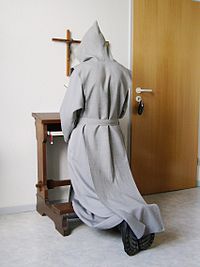Order of Cistercians of the Strict Observance
 |
|
| Abbreviation | Order of Trappists (O.C.S.O.) |
|---|---|
| Formation | 1892 |
| Type | Catholic religious order |
| Headquarters | Viale Africa, 33 Rome, Italy |
|
Abbas Generalis
|
Dom Eamon Fitzgerald |
| Website | www.ocso.org |
The Order of Cistercians of the Strict Observance (O.C.S.O.: Ordo Cisterciensis Strictioris Observantiae) is a Roman Catholic religious order of cloistered contemplative monastics who follow the Rule of St. Benedict. A branch of the Order of Cistercians, they have communities of both monks and nuns, commonly referred to as Trappists and Trappistines, respectively.
The order takes its name from La Trappe Abbey or La Grande Trappe, located in the French province of Normandy. A reform movement began there in 1664, in reaction to the relaxation of practices in many Cistercian monasteries.Armand Jean le Bouthillier de Rancé, originally the commendatory abbot of La Trappe, led the reform. As commendatory abbot, de Rancé was a layman who obtained income from the monastery but had no religious obligations. After a conversion of life between 1660 and 1662, de Rancé formally joined the abbey and became its regular abbot in 1663. In 1892 the reformed "Trappists" broke away from the Cistercian order and formed an independent monastic order with the approval of the pope.
The Rule of St. Benedict, written in the sixth century, guides the lives of Trappists. The Rule describes the ideals and values of a monastic life.
"Strict Observance" refers to the Trappists' goal of following closely St. Benedict's Rule and taking the three vows described in his Rule (c. 58): stability, fidelity to monastic life, and obedience. Benedict's insistence on lack of speech has some impact on their way of life, though (contrary to popular belief) they do not take a vow of silence. Trappist monks generally speak only when necessary; thus idle talk is strongly discouraged. According to St. Benedict, speech disturbs a disciple's quietude and receptivity, and may tempt one to exercise one's own will instead of the will of God. Speech that leads to unkind amusement or laughter is seen as evil and is banned. A Trappist sign language, distinct from other forms of monastic sign language, has developed to render speaking unnecessary. Meals are usually taken in contemplative silence as members of the order are supposed to listen to a reading.
...
Wikipedia
